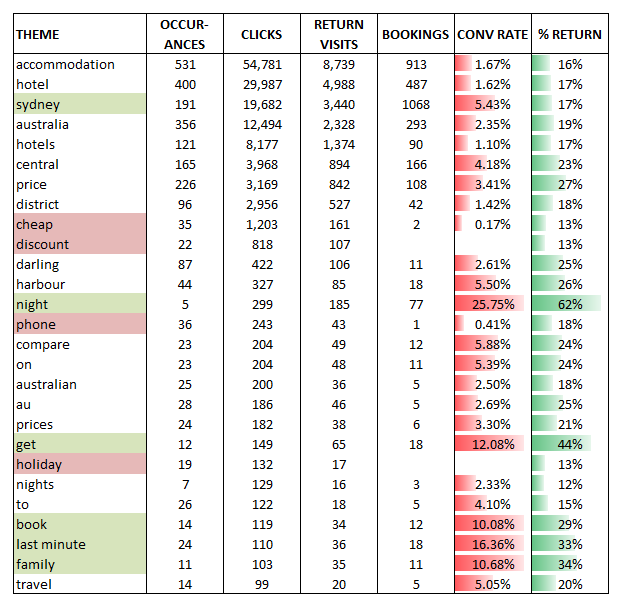Google's Keyword Tool is great for identifying keyword ideas to target in your PPC campaigns.
What Google's Keyword Tool is less useful for is uncovering the wide range of long-tail, highly-specific, and highly-relevant long-tail searches which could add real value to your PPC marketing.
Nor is Google's Keyword Tool good at advising which keywords are more likely than others at resulting in a sale, signup, or lead.
This is where your own Google Analytics data becomes extremely powerful. If you've been running a PPC campaign for some time, you should have a wealth of search query data upon which to analyze for performance trends and insights. But suppose you're just looking to start a PPC campaign and have no PPC search query data, or your PPC campaigns are very limited and you want to expand to include new keyword themes. All that Google organic keyword data you've been collecting over the years now becomes extremely useful.
1. Filter Out Your Brand Searches
Depending on the strength of your brand, you will find that a significant amount of your Google organic searches contain words relating to your brand, often made by people simply looking to find your website. These brand terms are usually made by people who already know your website and will naturally convert better than non-brand searches, so to better understand the opportunities for PPC marketing, you should look to filter out any brand searches.
In Google Analytics, go to Traffic Sources > Sources > Search > Organic, and select a date range which will provide a good amount of data. Next to the search box, click 'advanced', and specify one or more filters to exclude any keywords which include your brand terms. Click 'apply' and see if the majority of searches are now non-brand. If some brand-related mis-spells still appear, try to also filter these out by using part-words.
2. Consider The Extent Of Your Goal And Sales Revenue Data
Once you have filtered out your brand searches, you should now have a list of non-brand organic search data. These are the non-brand searches visitors have types into Google (and Yahoo / Bing etc) before finding your website in the organic search listings. The next step is to assess how these searches have performed at generating sales, leads, enquiries, or any other engagement metric you are looking to measure.
If you don't have goal tracking or ecommerce tracking set up in Google Analytics, you should seriously consider taking the time to add some Google Analytics goals. In the meantime you will be limited to metrics such as pages/visit, time on site, bounce rate, and returning visits as your measures of engagement. If you already have Google Analytics goals set up to measure enquires, signups, or leads, or ecommerce tracking set up to measure sales and revenue, you will be able to pick better insights from your organic search keywords.
3. Assess The Performance Of Different Themes
After you download your organic keyword data to Excel, you will probably find that a huge number of searches have been made only once. If you look at these individually, due to the lack of data any sales or conversions from these keywords are likely to be insignificant. It is difficult to say that a keyword with 1 visit and 1 sale is a better keyword than 1 visit and no sale.
This is where theme analysis becomes incredibly powerful. Rather than looking at each search phrase, try instead picking out individual words (or themes) from your whole list of searches, and comparing the performance of these themes. How did searches which contain the word 'free' perform, compared to searches which contained the word 'cheap'? How did searches which contain a location convert relative to searches which did not specify a location? Did searches which contained a purchase qualifier such as 'buy' or 'for sale' have a higher revenue per click (RPC) compared to phrases which did not contain any purchase-qualifying words?
4. Build (Or Expand) Your PPC Campaigns
Using any insights you find from your organic keyword analysis, start building a list of high-performing and poor-performing themes. These will then become your insights and strategy for your PPC campaigns. Any PPC keywords you add which contain high-performing themes can be given higher bids; any PPC keywords you add which include words with mediocre conversion rates can be given standard bids; and any poorly-performing themes which have very poor conversion rates or very high bounce rates (or or obviously not relevant) can be added as negative keywords to your PPC campaigns.
Take Advantage Of Your Data
Installing Google Analytics on your website will immediately provide a huge amount of data at your fingertips. It can be all too easy to suffer from data overload and analysis paralysis when trying to pull insights from this data, but if approached intelligently, with a clear strategy and process, it can be easy to quickly pick useful insights to help with your marketing activities.
Most businesses are likely sitting on a goal mine of useful organic keyword data, and at the same time have PPC campaigns which are struggling to provide a decent return on investment. Make sure you are not one of those businesses. Take advantage of all that juicy data, and let your PPC campaigns thrive as a result.
Follow-up reading:



